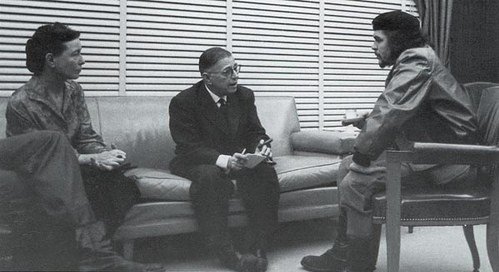Feminism and Feminist movements have a long story and tradition now: feminism began in the 18th century and it is alive still today. As the OED explains
the issue of rights for women first became prominent during the French and American revolutions in the late 18th century. In Britain it was not until the emergence of the suffragette movement in the late 19th century that there was significant political change. A ‘second wave’ of feminism arose in the 1960s, with an emphasis on unity and sisterhood…
One of the most famous and influential figures of feminism is Simone de Beauvoir. In her long intellectual career she moved from philosophical essays to fiction, from existentialism to feminism, from theory to practice. She died in 1986 and her last works appeared in the second half of the 20th century. A long time ago if we consider the speed with which circumstances, policies and politics, and life in general move now. So what has remained of Simone de Beauvoir’s writings today? Is she just one of those great minds whose work students must know to pass an exam, or is she still able to teach us (everyone, men and women at the same time) something important to improve our lives and relations in this world?
First of all we must never forget that Beauvoir was a rebel. She fought both against the middle-class prototype of woman, the woman whose unique realm was her home, and inequalities in general almost her whole life. This biographical aspect is important still today, since inequalities of all kinds still define Western societies and prevent the full development of our democracies.
Furthermore, abortion was a theme very dear to Beauvoir. She believed that women should be free to decide of their own bodies and not to be obliged to give birth if they didn’t feel ready to be mothers. Today this theme is a subject of debate even in Western countries where often the conservative wings of governments still tend to be against abortion: for instance in 2013, the conservative government of Texas voted an act which imposed a series of restrictions and limitations to clinics which exercise abortion. This topic is fundamental today because, as Beauvoir claimed, the interruption of pregnancy does not involve only women, but also men, children and society in general:
… abandoned children, martyr children, children left to foster care: this is the sad starting point for most delinquents, many criminals; these are the wretched men who hang themselves in our prisons, who die in psychiatric hospitals.
More strictly on the feminist level might be what Beauvoir defined as the intellectual inferiority. She claimed that at the beginning of the 60s in France women had the chance to access to brilliant careers such as lawyers or professors, but most of them tended to diminish their position since either they were afraid of appearing too aggressive in men’s eyes or they thought that after a year or two of work they would merry and stop working.
[Women] don’t try to proceed further, to become really excellent in their profession. They settle in mediocrity.
The imbalance between home and work for women produces, according to Beauvoir, a sense of guilt which disadvantages and penalises them. This situation is still real in countries such as Italy, where women need to work to help their husbands support their family, but often are left on their own device as far as the home is concerned. Therefore, the solution for Beauvoir is simple: the perfect sharing and organisation between husband and wife of the home duties. This solution might be extended to society in general, a sharing – and caring – society with a well-developed welfare state is preferable to a society which abandons its weaker citizens.
As we have seen, the thought of Beauvoir is easily applicable to the life-style of our modern societies and there are many women who still follow the feminist precepts. One of them is Laurie Penny, a journalist and feminist activist from London. Similarly to Beauvoir, not only are Laurie Penny’s work and battles focused on women liberation, but also on going further of any inequality in society. As a matter of fact, for The Guardian she wrote articles about masculinity, marriage, feminism 2.0, but also about cyberbullying, education, austerity, homophobia and islamophobia.
Hence, as these two women teach us, we should never stop fighting for the weak and rebel against injustices and inequalities.
If you are interested in this topic, you can check out Laurie Penny’s website which contains also her blog.


